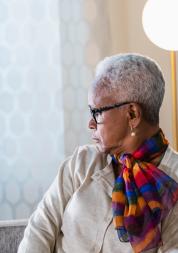Healthwatch champions call for action to improve care for people with 'Long COVID'

The five Healthwatch organisations (Healthwatch Barnet, Healthwatch Camden, Healthwatch Enfield, Healthwatch Haringey, and Healthwatch Islington) spoke to over three hundred local people, via online surveys, 1-2-1 interviews and community focus groups. They described the different ways Long COVID has affected them, physically, mentally and socially.
Recent figures from the Office for National Statistics (ONS) show that the number of people living with Long COVID now stands at its highest level since records began to be collected, with as many as 1.7 million people, or 2.7% of the UK population reporting symptoms.
Though there is still lots to learn about Long COVID, its damaging impact on people’s health and their quality of life is clear.
Working together, the five Healthwatch investigated local people’s experiences of Long COVID. The aim was to identify any gaps in the help they are being offered. The information gathered can now be used to support the development of services and systems to help local people manage their symptoms.
Key findings
Physical health
Patients described a wide range of physical symptoms such as fatigue, muscle and joint aches, coughing, ‘brain fog’, shortness of breath, heart problems, general pain, pins and needles, dizziness, gastric distress, sleeping difficulties, tinnitus and rashes.
Mental health and wellbeing
Developing Long COVID also had a significant impact on mental health and wellbeing. This included lower self-esteem and confidence, less communication with their family, talking to friends and participating in other social activities, more anxiety and low mood, as well as depression.
Employment
Long COVID impacted on people's ability to work, leading to some people having to reduce their working hours, stop working or be made redundant. Those in employment felt pressured to return to work due to a lack of understanding of the challenges of Long COVID. Many worried about the number of days they had taken off work, which could result in disciplinary action.
Home life
People living with Long COVID were struggling with a range of activities in their home life. These included personal care, leisure activities, maintaining a healthy lifestyle including regular exercise, life planning, relationships, caring responsibilities and education.
Experiences with the healthcare system
People described the challenges of accessing and using the NHS. There were problems with receiving a diagnosis and a referral. There was a lack of knowledge of Long COVID among GPs. Most people experienced problems being referred to community teams, hospitals, the specialist Post COVID Clinic, diagnostic testing within primary care and being informed of self-management tools and techniques.
The majority of people with Long COVID said that they had to carry out their own research into the condition.
Nearly half the respondents said the most helpful thing to support their Long COVID recovery was self-management techniques, and most of them found out about these techniques themselves.
I know that it’s a new illness and it’s so difficult to know what to do, but I am so frustrated and upset, it feels hopeless as I’ve not been offered anything that’s helped me so far. One doctor told me it’s all psychological and it’s down to the patient to figure out what to do for themselves.
Long COVID has badly affected the organisation I used to work for and I, along with many others, accepted voluntary severance.
Additional resources need to be put into support groups and services, as it appears very little is available even after a GP referral.
Key Recommendations
Our recommendations, covering primary care, improvements to the Long COVID pathway, local public health, and employers’ responsibilities to patients.
NHS Primary Care
- Improve access to GP services and face-to-face appointments.
- Increase training and support for GPs and other primary care clinicians so they can be better informed on Long COVID and its symptoms.
- Build awareness of local support and treatment already available for patients through communications campaigns.
North Central London Clinical Commissioning Group (NCL CCG)
- Ensure greater consistency in people’s experiences accessing the Long COVID pathway, taking into account their physical, mental and social needs.
- Ensure at the point a patient is referred for Long COVID support the treatment pathway is explained and communicated to them in an accessible form.
- Ensure all patients on the Long COVID pathway are clear about how things will be followed up after their first appointment.
- Patients who are diagnosed with Long COVID or referred for further support should be given immediate access to self-care and self-management resources regardless of the 12-week NICE guidance.
- Invest in the development of local peer support groups for people with Long COVID.
Long COVID Clinic and Community Teams
- Ensure patients on the Long COVID pathway know how to contact the clinical team responsible for their care through phone and email.
Councils
- Local Education Authorities should work with teachers through education and training to support families whose children are absent from school due to Long COVID.
- Local Public Health teams should continue to monitor data and conduct an ongoing needs analysis of Long COVID in communities to inform how NCL CCG can make the Long COVID services fairer in order to address inequalities.
- Local Public Health teams should publish their data on Long COVID to make it more visible.
Employers
- Employers in North Central London's statutory services, such as NHS Trusts, Councils and the NCL CCG, working with the NCL’s Long COVID Vocational Rehab Service, should recognise and accommodate employees diagnosed with Long COVID through flexible working policies.
We would like to thank our Healthwatch colleagues for their work to produce such a comprehensive picture of the experience of people living with Long Covid in NCL. Hearing feedback from our communities and their personal stories is vitally important to help us reflect on the care we offer. This report and its recommendations will help us to better understand what our residents need from us, and how we can improve access to services, experience of care, and clinical outcomes for everyone.
Downloads
Read the North Central London Healthwatch Long COVID Report
Read the Healthwatch Haringey Long COVID Report
Post COVID-19 recovery: Information to support your physical and mental health
This NHS Post COVID-19 Recovery Pack contains information for Long COVID patients on how to help manage ongoing physical symptoms and where to find support to manage feelings of anxiety and low mood.
Healthwatch England has produced information about Long COVID
- What is Long COVID?
Find out the common symptoms and when to get support.
-
Support and treatment for Long COVID

